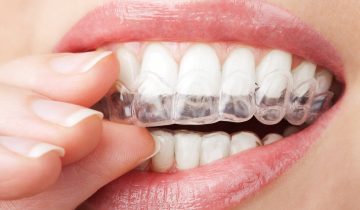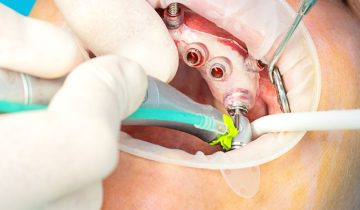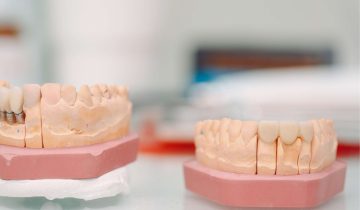Last updated on August 16th, 2023
Cosmetic dentistry has several obvious advantages. A lot of people from all over the world are seeking ways to achieve a better smile through various dental treatments. According to the report released by Fortune Business Insights in 2020, the global market size of cosmetic dentistry was $23.02 billion in 2018 and is estimated to reach $43.06 billion by 2026.
As the figures suggest, there is a growing interest in cosmetic dentistry nowadays. However, is cosmetic dentistry all it’s cracked up to be? What about risks and complications? In this article, we will explain the potential risks of cosmetic dentistry by touching on various factors. Then, we will give you some tips to minimize the risks of cosmetic dentistry so that you can make the most of your dental treatments without worrying about the end results.
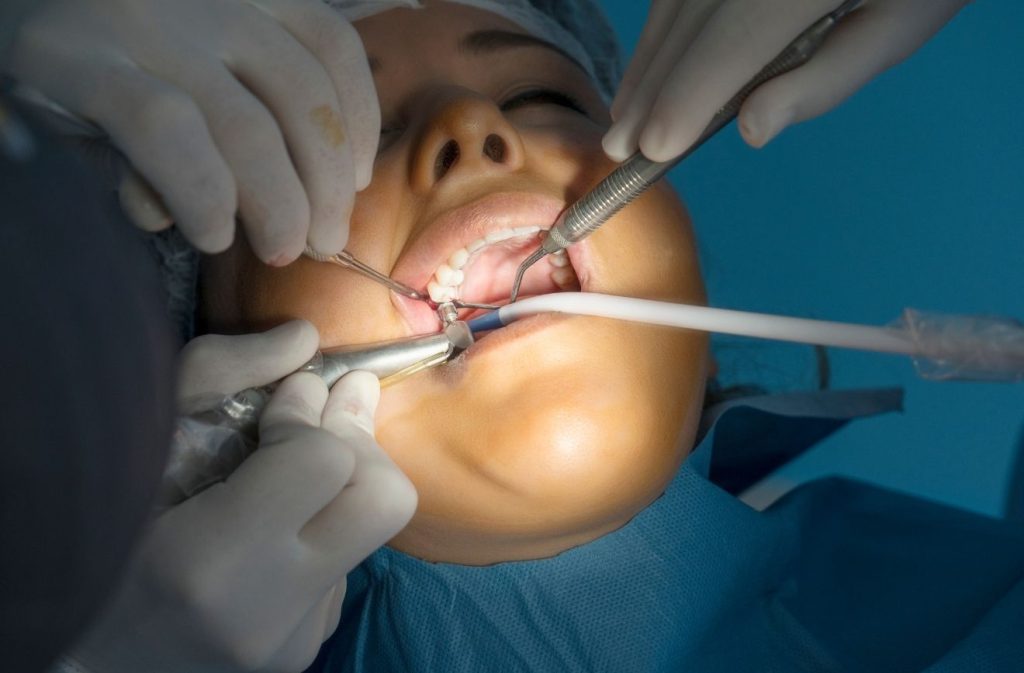
The Potential Risks Of Cosmetic Dentistry
People might have cosmetic problems with their teeth due to various reasons, and cosmetic dentistry provides transformative cosmetic solutions. However, sometimes patients may end up with undesirable results. Here are some of the most common problems that patients may experience during or after a cosmetic dentistry treatment.
Allergic Reactions
Cosmetic dentistry materials may cause allergic reactions. According to a study published in The Journal of Diagnostic and Clinical Research in 2015, latex and polymethyl methacrylates can lead to delayed hypersensitivity reactions. As well as, sodium metabisulphite and nickel which can cause immediate allergic reactions. Therefore, patients and dentists should consider the documented allergies of the patient before starting any cosmetic dentistry treatment.
Complications From Anesthesia
Anesthesia is an effective way to avoid pain during treatment, but it can cause certain problems for some patients. Usually, general anesthesia involves more risk of complications. Fortunately, cosmetic dentistry hardly ever makes use of general anesthesia. Though the reactions to the anesthesia can vary from one patient to another, the most common reactions are nausea or vomiting, headache, shivering, sweating, dry mouth, or a sore throat.
Damage To Teeth And Gums
Some cosmetic dentistry procedures might cause problems with hard and soft tissues in and around patients’ mouths. Here are the different types of risks involved in cosmetic dentistry.
Tooth Sensitivity
Tooth sensitivity is among the most common risks of cosmetic dentistry that patients experience soon after getting veneers. The sensitivity is greater if the nerve of the tooth was affected by the grinding down of the tooth surface. Also, teeth may be sensitive when drinking too hot or cold beverages after getting veneers. The risk of sensitivity is not limited to veneer treatment. For example, teeth whitening can cause tenderness and sensitivity due to some materials used in the procedure such as hydrogen peroxide and carbamide.

Tooth Damage (Damage to Tooth Enamel)
Damage to the tooth can pose a risk during an enamel shaping treatment if the dental professional is not experienced enough or is careless. However, some additional procedures can rectify any persistent problems you may have with your teeth if damage has occurred.
Gum Irritation
Gum irritation is a common side effect that patients may experience after teeth whitening. The chemicals used in the whitening procedure may cause inflammation or irritation, which can lead to further swelling and discomfort.
Nerve Damage
Nerve damage is a potential risk in some of the anesthesia and dental implant treatments. It is very rare but can be potentially dangerous. Some of the damages can be corrected, while others may become permanent. Therefore, choosing an experienced and competent dentist is of critical importance for patients.
Infection
Veneers or dental implants might cause infections in the tooth structure or gum tissue. Patients usually notice an infection through pain or swelling. Most infections go away within a couple of days following treatment. If an infection persists or gets worse, then you should see your dentist. Dentists can clean the area and/or prescribe antibiotics. In some cases, the dental implant itself can cause an infection. In such cases, the implant needs to be removed.
Unsatisfactory Results
Some patients might not be completely satisfied by the results because the new appearance of their smile doesn’t look as beautiful as they had imagined. Even if there were no complications or side effects for the patient, he/she might still feel disappointed with the results.
Such problems usually stem from the lack of communication. Many people want a smile like a celebrity they see on TV. However, a Hollywood smile may not be appropriate for his/her face. A customized smile design is much more important than creating a fabricated look on a patient. Therefore, dental professionals or clinics should listen to their patients carefully and explain the steps they will follow by illustrating a digital preview of the projected outcome.
Bite Issues
Common cosmetic dentistry procedures such as veneers, crowns, or implants might lead to bite issues. For example, bulky veneers or improperly placed crowns can damage the balance of upper and lower teeth alignment, which can lead to an overbite, underbite, or other bite problems.
What Are The Causes Of The Potential Problems?
Here are a few of the most common causes of problems following cosmetic dentistry treatments.
Unqualified Practitioners
Unqualified or inexperienced dental professionals may have difficulty in practicing some cosmetic dentistry procedures, and thus cause some of the problems listed above. Patients should look for qualified and experienced dentists for any and all treatments they need.
Poor Oral Care
Some patients can have delayed complications or other problems after getting cosmetic dental treatment even though they have had a very successful treatment. Most of the time, it was found that patients didn’t follow the oral care routines (toothbrushing regularly, flossing, avoiding certain food or drinks ..etc.) prescribed by dentists. Therefore, it is very important for patients to maintain proper oral care.
Poor Communication
Patients and dental professionals need to have strong communication before the treatment can occur. The needs and expectations of the patient should be clear and practical for both parties. Also, if the patient has any health issue, he/she should inform the dentist about it so that the dentist can tailor a treatment plan for the patient.
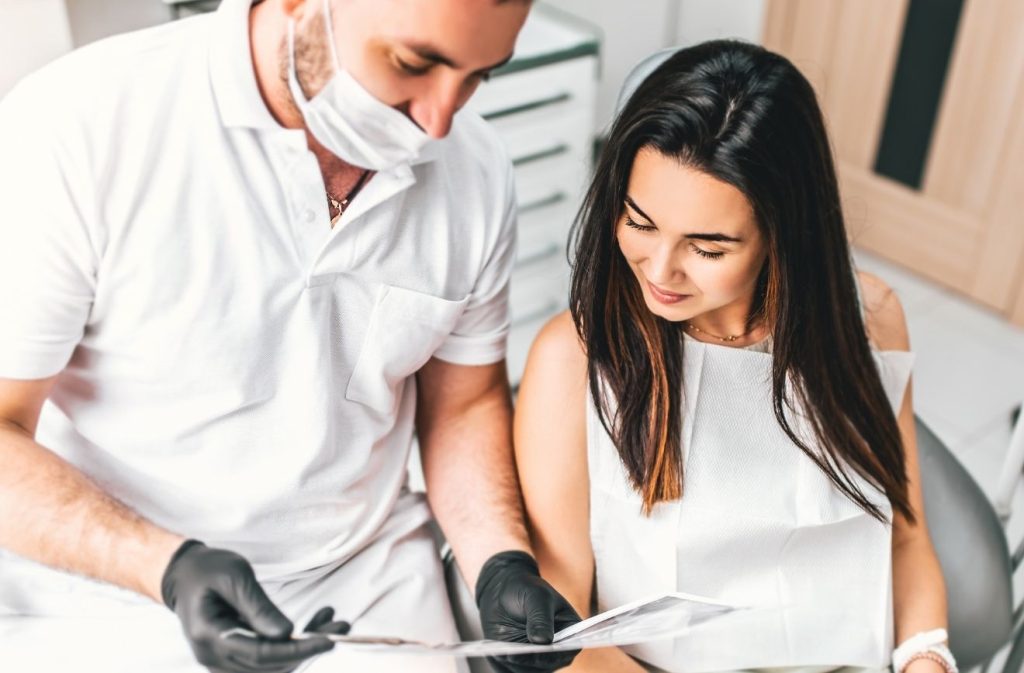
How To Reduce The Risks Of Cosmetic Dentistry?
We should acknowledge that eliminating the risks of cosmetic dentistry completely is not possible. However, there are still ways to reduce potential postoperative problems.
Choosing a reputable and experienced cosmetic dentist is one of the first things you can do to avoid undesired results. When searching for a good cosmetic dentist, you should also consider the communicative side of potential dentists. Remember that good communication is not limited to speaking your native language. A good dentist should listen to you carefully and discuss your case with effective collaboration. At this point, informing your dentist of any allergies or medical conditions is critical. Only then, you can expect him/her to blend their theoretical knowledge to deal with your case properly.
Moreover, monitoring your oral health closely after the procedure is another good point for a positive cosmetic dental experience. A good follow-up appointment can drastically decrease the risks of cosmetic dentistry. On the other hand, making the most of this monitoring requires your cooperation, as well. Note that almost any dentist will give you proper aftercare instructions following treatment. But it is your responsibility to adhere to those instructions so that you can avoid the risks of cosmetic dentistry.

